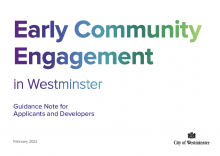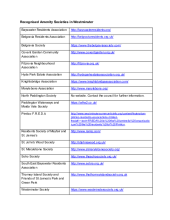Pre-application community engagement and consultation on planning applications
Find out about pre-application engagement, read about the consultation process at application stage and contact amenity societies
Pre-application community engagement
Early Community Engagement Guidance
The council has published guidance to assist applicants and developers, their agents, and community representatives to more clearly understand the council's expectations for planning pre-application engagement. The guide supports developers to deliver earlier, more inclusive and more transparent and responsive community engagement in Westminster on their emerging development proposals. The guidance is available to view at the link below.
Using the guidance
The guidance provides a framework to support applicants and developers to undertake community engagement at the earliest stage in the preparation of new development proposals. Community engagement should occur at the earliest possible stage and prior to initial engagement with the council through its planning pre-application advice service.
The guidance highlights best practice digital and in person methods for community engagement and identifies how best to engage groups and individuals from across different communities, including those that are less often heard from on.
When seeking planning pre-application advice we will expect applicants and developers to provide details of the engagement they have undertaken and the feedback they have received in an Early Engagement Strategy. The guidance provides advice on what an Early Engagement Strategy should include.
Where community engagement has been undertaken, our validation checklists require applications to be accompanied by a Statement of Community Involvement explaining the community engagement that has been undertaken and how the proposal has evolved in response to the feedback from engagement.
Consultation during a planning application
A consultation period of 3 weeks is normally provided to allow members of the public the opportunity to comment on planning applications
Consultation notices can take the following forms:
- details of the application are published on our website
- a site notice may be erected outside the property
- an advert may be placed in the local press
- letters may be sent to adjoining residents
- consultations may also take place with statutory consultees such as the Environment Agency, the National Amenity Societies and Historic England, neighbourhood forums (where requested) in addition to others including local amenity societies.
Find our more about how to submit comments online.
Contact your local amenity society or neighbourhood forum
Your local amenity society or neighbourhood forum may be able to assist you if you wish to comment on a planning application or get involved in neighbourhood planning.
You can check the list of recognised amenity societies and other groups who we consult on planning applications or use the interactive map below to search by address to find the relevant societies and neighbourhood forums operating in your area.
Search our interactive Map of amenity societies and neighbourhood forums
The council undertakes a review of amenity societies every few years to keep details up to date.
In addition to these groups, much of our borough is now covered by designated neighbourhood forums. Where they have made a request, neighbourhood forums are are standard consultees on planning applications in the area they cover.
We also consult a range of other local and special interest groups, such as conservation and 'friends' groups.
Recognising amenity societies
We have a long-standing system of recognising certain amenity societies within particular areas.
To be identified as ‘recognised’, groups are asked to demonstrate they have a wide membership within a particular area, good governance arrangements in place as well as access to some relevant expertise for example in relation to architecture, conservation and planning.
Societies which cover small areas, have a small membership or single issue focus would not generally be designated as recognised amenity societies but may still be consulted on applications.
We undertake a review of amenity societies every so often to keep details up to date.
Published: 14 December 2020
Last updated: 27 October 2022


